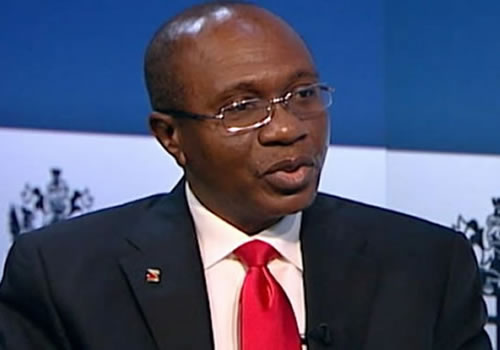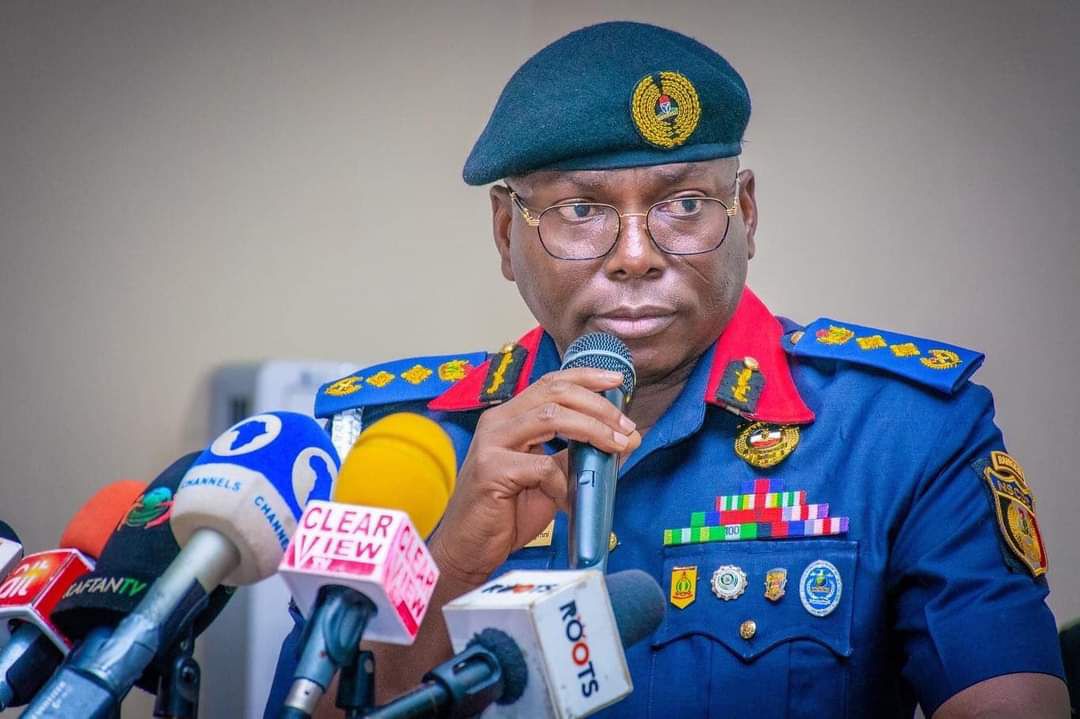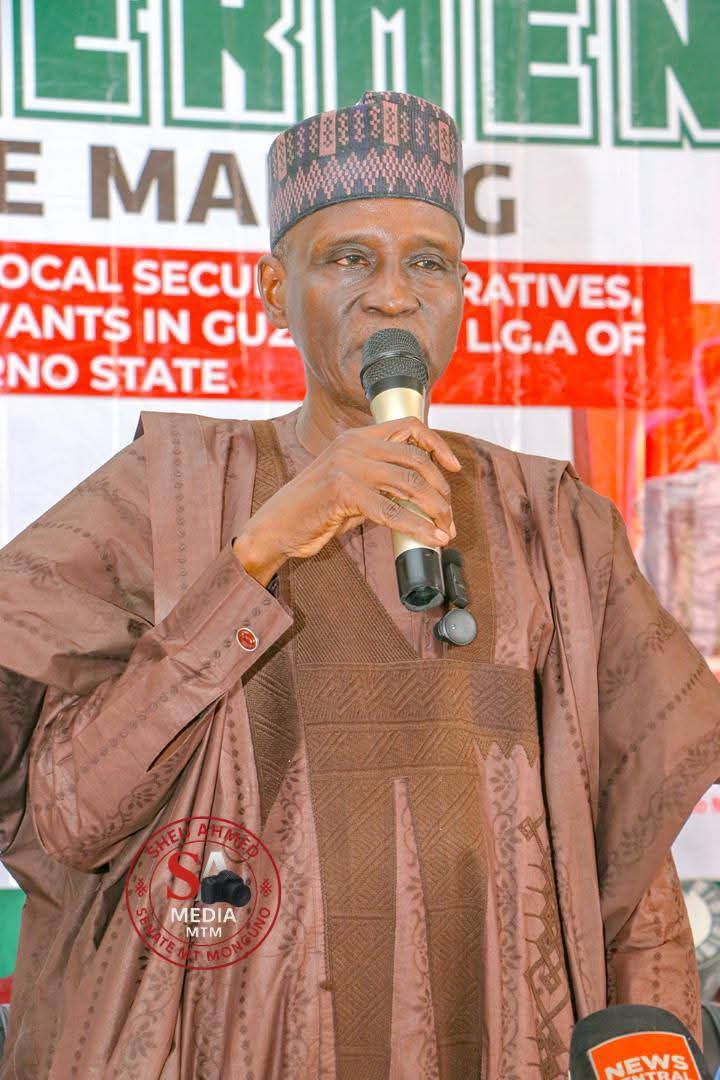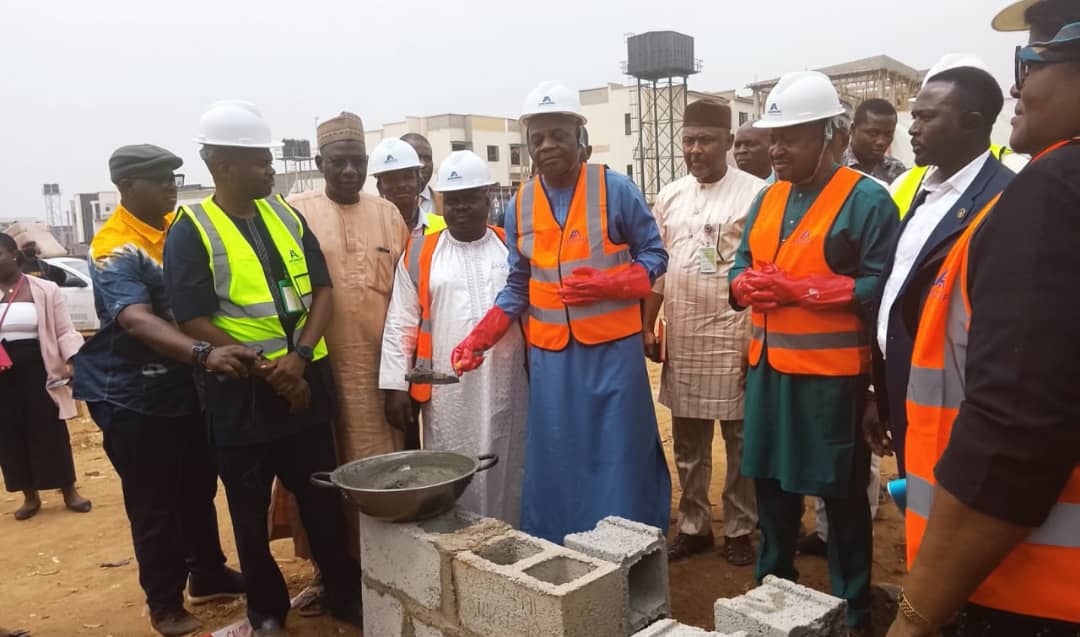News
Governor of Central Bank of Nigeria, Godwin Emefiele Breaking New Grounds

By Rev Solomon Semaka
In 2015, when Muhammadu Buhari assumed office as the president of the Federal Republic of Nigeria, he came with a lot of enthusiasm and that messianic wand to change the story of Nigeria that was on the verge of collapsing especially economically.
As a new sheriff in town, President Buhari made a lot of administrative changes, dissolved many boards and many heads of agencies and public service institutions that were not worth their unions were sacked or relieved of their appointments. This was done to take the country back on track towards economic recovery and prosperity.
However, one of the few places that the head was not changed was the apex monetary authority; the Central Bank of Nigeria otherwise known as CBN where a thoroughly bred economist, a financial expert and reputable banker, Godwin Emefiele was holding fort as the Governor having been appointed by the previous administration of Jonathan Goodluck on June 4, 2014.
For the Governor of the Central Bank, Godwin Emefiele to have gained the confidence of President Buhari, it is therefore, unambiguously an indication that he was doing something spectacularly different that worthily fitted into the change mantra of the current led administration. For instance, during his first term, he supervised an interventionist currency policy at the behest of the presidency, propping up the Nigerian naira by pumping billions of dollars into the foreign exchange market. He also introduced a multiple exchange rate regime to try to make pressure on the naira and avoid series of devaluations.
It is also pertinent to highlight unequivocally that the Central Bank under the watchful financial conscious eyes of the Governor; Godwin Emefiele has also taken the cashless policy in Nigeria to an unprecedented level.
For the avoidance of doubt, the Central Bank developed the cashless policy in 2012, which required a daily total limit of N500, 000 and N3,000,000 on free cash withdrawals across all accounts owned by individual and corporate customers respectively. The pilot was run in Lagos state from January 2012 while the policy took effect in Rivers, Anambra, Abia, Kano, Ogun and Federal Capital Territory (FCT) on July 1, 2013. The policy was implemented nationwide on July 1, 2014 a few days Godwin Emefiele assumed responsibility as the Governor of Bank.
Before the introduction and implementation of the cashless policy in Nigeria, Bussiness Day had noted that “the ease of cash flow occasioned by the cash-based economy made Nigeria vulnerable to fraud, terrorism, and crime. Armed robbers attacked bullion vans and customers who carried large sum of cash. Apart from that, the central bank spends billions of naira to remove and replace dirty notes in circulation”.
In other to effectively entrench the new cashless regime in the 6 states and the FCT, the Central Bank under Emefiele licensed 26 Mobile Money Operators, 10 Super Agents, 21 Payment Terminal Service Providers, 21 Payment Solution Service Providers, 4 Third Party Processors, 9 Switches and 5 non-Bank Acquirers. It is expected that these licensed entities will smoothen the implementation of the Cashless Policy across the Payments System.
Taking a careful look at the achievements of the cashless policy, Bussiness Day reports that “as evidenced by the NIBSS second-quarter fraud report of 2019, attempted fraud volume decreased by 47.28 percent from Q1 figures, while Web, ATM and Mobile remain the usual suspects to be used by fraudsters”.
“Okojere noted the growth in the volume of transactions that occurred in 2012 against 2018, following the Cashless Policy re-introduction and increase in usage of electronic transactions”.
Consequently, transactions on instant payments grew from 4 million in 2012 to 729m in 2018, transactions on PoS from 2.5 million in 2012 to 285 million in 2018, and transactions on Mobile Inter-Scheme grew from 2,200 in 2012 to 15 million in 2018”.
One of the areas that the administration of President Buhari will be fondly remembered even by generations yet unborn is the agricultural revolution. The peak of its commitment was the directive by the president to the Central Bank on August 13, 2019 not to make foreign currency available to fund food imports.
Otherwise, according to Emefiele in an interview with TBY in 2018 stated categorically that “four commodities—rice, fish, sugar, and wheat—make up nearly NGN1.3 trillion (USD3.6 billion) annually in import bills. These and other commodities on the 41 items list are a drain on our FX reserves. Our proclivity for imports has enriched other countries and impoverished ours. We cannot depend on other countries for food; that exposes us to unquantifiable social and economic vulnerabilities. If we increase domestic food production, we will create jobs, reduce poverty, and shield our economy from foreign impulses”.
“Thus, the CBN is channeling a great deal of development finance and interventions towards agriculture to ensure sufficiency in the production of food and raw materials through our various development finance mechanisms and schemes. Our intention is to ensure that Nigeria does not depend on other countries for most of the things we consume. We must ensure that our non-oil current account balances stand hugely positive”.
“On this note, the Anchor Borrowers’ Program (ABP) has recorded spectacular success, especially with regard to rice production. As we speak, rice production has increased several-fold. Kebbi State alone is expected to produce over 2 million metric tons of rice annually, while employees at Labana Rice Mills seek to keep pace with demand, processing 320 tons of rice a day, a 250% increase from the previous year. Therefore, we have seen sharp drop in rice imports that translates to a significant reduction in rice import bills, saving us over USD600 million in 2016 alone”.
An interesting thing about Godwin Emefiele is that since the return of democracy in Nigeria in 1999, he is the first governor of the Central Bank of Nigeria to serve a second term in office. The senate of the Federal Republic of Nigeria while screening him for a second term in office in May 2019 through its chairman on Banking, Finance, and other Financial Institutions, Rafiu Ibarahim said the committee was impressed with Mr Emefiele’s more than 32 years’ experience with outstanding performance.
The committee recommended confirmation of Mr Emefiele based on performance in his first tenure. “That the nominee understands the diverse economy of the country and has displayed profound knowledge of the continuous existence of our economy stability. That the nominee has performed credibly in his first tenure which resulted to the exit of the nation out of economic recession”, Mr Ibrahim said. His confirmation was put to voice vote and received a unanimous ‘ayes’ from the senators, reports Premium Times on May 16, 2019.
Consequent upon his confirmation and reappointment for a second term in office, Emefiele the CBN governor unveiled his policy thrust for the next five years. Although the policy document outlines a number of objectives, the most important ones include
a) the aim to achieve double-digit GDP growth in the next five years,
b) bringing down inflation to single-digits
c) improving the payment systems infrastructure and driving financial inclusion to 95% by 2024,
d) maintaining the existing exchange-rate policy regime of a managed float and
e) recapitalisation of the banking industry.
In order to cushion the effect on the Covid-19 pandemic on the Nigerian economy and to ameliorate the sufferings of the poor masses, the Buhari led administration through the Central Bank introduced a N50 billion Targeted Credit Facility as a stimulus package to support households and micro, small and medium enterprises that are affected by the coronavirus pandemic.
This was part of measures and policies aimed at making sure that Nigeria’s economy does not slip back into recession due to the coronavirus pandemic and low oil prices.
The Central Bank of Nigeria (CBN) has so far announced the disbursement of over N49 billion out of N50 billion targeted facility for households and small businesses to over 80,000 families and households.
In addition, healthcare facility operators also benefitted from a N100 billion intervention fund and another N1 trillion fund for the manufacturing sector and is aimed at ensuring that productivity is enhanced, thereby working a way out of the impact of this pandemic.
It is very important to point out that there are many other areas that the Central Bank of Nigeria under the leadership of Godwin Emefiele as the governor has done creditably well to save the Nigerian economy from slipping into recession, the above mentioned are just but the tip of an iceberg.
Therefore, it is imperative to call the President Muhammadu Buhari led administration not to relent in its efforts in supporting Emefiele in the discharge of his onerous duties so as to make the Nigerian economy viable, dependable, sustainable, reliable and strong.
Semaka is a public affairs commentator and Convener of Save Nigeria Movement.
News
Audi: Trajectory of Success and Changing the Narrative

From a plethora of achievements and milestones—despite daunting challenges and shortcomings—the foresight, vision, and focused leadership of the present administration have transformed and repositioned the Service like never before in its history. In spite of limited funding and other grey areas yet to be addressed, the leadership has successfully turned around the narrative through deliberate rebranding efforts since assuming office.
Staff welfare remains paramount to the Commandant-General, who has consistently prioritized boosting esprit de corps and high personnel morale through the prompt payment of salaries, allowances, and other official entitlements as and when due. The leadership has also entrenched core values of integrity, intelligence-based security response systems, and professionalism across all operations. These measures have significantly reduced the activities of criminals, vandals, kidnappers, herdsmen, and illegal miners across the country.
In a press release signed by Mahmud Bello, Director of Media and Stakeholders Engagement of the Citizen Watch Advocacy Initiative (CWAI) in Kaduna State, the organization stated that the paramilitary agency has demonstrated genuine commitment to the interest of Nigerians through its open-door policy and robust engagement with its various publics. This approach has greatly reduced threats and disaster incidences nationwide through professional intelligence gathering, investigation, information sharing, manpower development, and strong collaboration with sister agencies—leading to remarkable improvement in disaster management as first responders.
Accordingly, transparency, accountability, and good governance have remained at the forefront of the present administration’s transformational philosophy. This has resulted in far-reaching reforms, including the regulation of private security companies, the introduction of Mining Marshals to secure strategic mining sites nationwide, containment of vandalism of critical national assets, reduction of oil theft in the Niger Delta region, and the assumption of VIP protocol protection responsibilities. These achievements surpass those of previous administrations and mark a significant milestone in the Service’s evolution.
CWAI authoritatively confirmed that the present management has introduced comprehensive institutional reforms that have repositioned the Service for greater productivity, efficiency, and effectiveness in delivering its mandate of safeguarding lives, property, and critical national assets—thereby reducing criminal activities and enhancing national security.
The Commandant-General, Professor Abubakar Ahmad Audi, reiterated that the reforms introduced align with his vision to upgrade the operational machinery of the Corps. He noted that the reorganization and revitalization of the training department are aimed at sharpening the skills and competencies of personnel to effectively address contemporary security challenges posed by hoodlums, bandits, kidnappers, and insurgents.
The establishment of the Mining Marshals and the Special Female Squad (SFS) are novel initiatives and the first of their kind in the history of the Corps. In response to the Federal Government’s Safe Schools Initiative, the NSCDC conducted audits and surveys of schools nationwide and developed a framework for proactive security measures to address the persistent attacks on educational institutions. These squads, like the Mining Marshals, are strengthening partnerships with local communities and stakeholders while prioritizing surveillance and monitoring to curb violent attacks and criminal activities.
The statement further emphasized that the Directorate of Legal Services has been reinvigorated and strengthened with enhanced prosecutorial competence, improving law enforcement and accountability. Similarly, the Anti-Vandal Unit has undergone major reforms and has been strategically deployed across the South-South geopolitical zone to curb pipeline vandalism, crude oil theft, and destruction of critical national assets. Over 2,500 suspects have been arrested since the beginning of the year for offences ranging from vandalism and attacks on national infrastructure to cattle rustling, banditry, attacks on farmers and farmlands, and illegal mining.
The Commandant-General attributed these successes to effective inter-agency collaboration, synergy, and partnerships, calling for comprehensive manpower development within the national security architecture.
Sports have also received significant attention under the present leadership, with officers and men of the NSCDC winning numerous laurels and trophies in various sporting engagements. All personnel, regardless of rank, have been provided with insurance cover against accidents, disability, or death in the course of duty. The Commandant-General views sports as a unifying platform that promotes wellness, camaraderie, information sharing, and mutual trust among paramilitary agencies.
CWAI further noted that the crackdown on illegal mining activities has saved the economy substantial revenue losses, while the destruction of over 450 illegal refineries has reduced oil theft. Additionally, the arrest of suspects and recovery of critical assets and railway materials valued at over ₦5 billion represent major milestones of the Service.
The organization therefore endorsed the change mantra of the Audi-led management and expressed confidence in the present leadership, noting that Nigerians are proud of its achievements despite prevailing challenges.
CWAI urged personnel to remain good ambassadors of the Corps—incorruptible and aligned with international best security practices wherever they serve. Nigerians were also encouraged to support the management in strengthening efforts against vandals and criminals nationwide.
The organization appealed to corporate bodies and public-spirited individuals to support President Bola Ahmed Tinubu’s Renewed Hope Agenda, particularly efforts to modernize the NSCDC through funding, partnerships, manpower development, capacity building, and the acquisition of modern security equipment.
Finally, CWAI emphasised the need for increased national budgetary allocation to the NSCDC in view of its critical role in the nation’s security architecture, including its added responsibility of VIP protocol protection. It also called for the entrenchment of a standard training curriculum to enhance career progression, effective supervision, and transparent regulation of Private Guard Companies across the country.
News
Senator Monguno Launches ₦250 Million Mega Empowerment Programme for 2,500 Constituents

The Senator representing Borno North Senatorial District, Chief Whip of the Senate and Vice Chairman of the Senate Committee on Appropriation, Distinguished Senator Mohammed Tahir Monguno, has unveiled a ₦250 million Mega Empowerment Programme designed to strengthen grassroots economic development through skills acquisition and financial support. The initiative, targeting 2,500 constituents, commenced with the disbursement of ₦125 million to 1,250 beneficiaries in the first batch, each receiving ₦100,000 as start-up capital. The second batch of 1,250 beneficiaries is scheduled to receive the remaining ₦125 million next week, ensuring equitable coverage across the constituency. Ahead of the disbursement, participants underwent a four-day intensive training in Tie and Dye, Cake Making, Tailoring, Entrepreneurship, Soap Making, Groundnut Cake Production, and Hairdressing. The programme deliberately focused on youths and women, equipping them with practical skills to foster self-reliance, productivity, and sustainable livelihoods. Prominent stakeholders, including Alhaji Kallah Maina Monguno, Hon. Mohammed (M-Gas), and APC Local Government Chairmen, commended Senator Monguno’s people-focused leadership. They described the initiative as timely and impactful, urging beneficiaries to apply the support responsibly as a strategic investment in human capital development. Speaking on behalf of the organisers, Mr. Suleiman reaffirmed their commitment to transparency and sustainability, advising participants to remain disciplined and dedicated to their chosen trades. The event drew wide attendance from political leaders, religious figures, and youth and women group representatives, underscoring its significance. Senator Monguno emphasized that the programme is not a one-off intervention but a long-term strategy to strengthen skills acquisition, promote entrepreneurship, and create sustainable sources of livelihood. He noted that the initiative complements Governor Babagana Zulum’s human capital development agenda and aligns with the broader vision of reducing unemployment and fostering inclusive economic growth in Borno State.
News
TETFund Begins Construction of Abuja Leadership Centre

The Tertiary Education Trust Fund (TETFund) has initiated the construction of the Abuja Leadership Centre of Excellence in Public Governance at Yakubu Gowon University, formerly known as the University of Abuja.
The Executive Secretary of TETFund, Sonny Echono, officially launched the project alongside the Vice-Chancellor of the University of Abuja, Professor Hakeem Babatunde Fawehinmi, and the Director of the Centre, Professor Philip Dahida, during a ceremony held on Tuesday in Jahi, Abuja.
During the event, Echono emphasized the goal of making the Abuja Leadership Centre “a stopping point for every leader visiting the country.” He described leadership as a crucial element of national development, noting that the success or failure of nations often hinges on the quality of leadership they cultivate.
He highlighted that effective leadership relies on a collective effort to utilize intellectual, human, and material resources, which, when efficiently coordinated, can drive national development aspirations.
Echono disclosed that TETFund plans to commission approximately 467 projects across tertiary institutions nationwide between now and October. “It is my prayer and hope that this centre will become a stopping point for every leader visiting our country. Its location in the nation’s capital is not accidental,” he remarked.
The TETFund boss expressed optimism that the Abuja Leadership Centre would develop into a world-class facility capable of nurturing leaders across various sectors of the economy and hosting globally recognized speeches, conventions, and declarations.
The TETFund Executive Secretary urged the contractors responsible for the project to meet expectations, emphasizing that the goal is to create a facility of international standard. He assured that TETFund would provide funding not only for construction but also for high-quality furniture and equipment.
According to him, the Centre is envisioned as more than just a conference hall or auditorium; it aims to be a top-tier leadership facility where visiting heads of state and their delegations will feel at home, comparable to similar facilities worldwide.
Echono praised the leadership of the University of Abuja and the Centre for the stability and direction they have brought to the institution, reaffirming TETFund’s commitment to collaborating in order to realize the vision of the university’s founders. He emphasized that, by its name and mandate, the university must continue to promote national unity, integration, and excellence, particularly in leadership and governance.
Regarding the commissioning of projects, he noted that it would not be feasible for the agency to inaugurate all projects directly, but at least 50 iconic projects would be selected across the states, with a minimum of two to three in each state.
Earlier, in his remarks, Vice-Chancellor Professor Fawehinmi stated that the groundbreaking ceremony marks a new phase in the university’s collaboration with TETFund. He noted that the Abuja Leadership Centre would function as a center of excellence for public governance and leadership, serving as a national hub for training future leaders who will significantly impact policy formulation and national development.
The Vice-Chancellor commended Echono’s leadership at TETFund, pointing out that under his guidance, the agency has transformed tertiary education not only through physical infrastructure but also in staff development, libraries, and other essential facilities.
He expressed confidence that TETFund would ensure the timely completion and proper furnishing of the Abuja Leadership Centre so that it can be fully utilized to achieve its objectives. Fawehinmi assured that the university would maximize the use of the facility, describing the project as a historic intervention that would be remembered for years to come.
“Today, we further strengthen our long-standing partnership, and we are delighted to announce that this Abuja Leadership Centre will be a center of excellence for public governance and leadership. It will serve as a national hub for training future leaders who will be involved in policy decisions for the development of their country. We extend our gratitude to you and your team, as we recognize the importance of nurturing our relationship into the future. Executive Secretary, you have done exceptionally well over the years. You have led one of the most impactful intervention agencies for tertiary education in the country, and we are very proud of your achievements,” he added.
The Director of the Abuja Leadership Centre, Professor Dahida, praised TETFund for commencing the construction of its permanent site, stating that the development signifies the realization of a vision rooted in the belief that leadership is the most vital resource for good governance, institutional excellence, and national development.
Dahida revealed that the Centre was established to serve as a hub for thought leadership, capacity development, policy dialogue, and ethical reorientation, not only for the University of Abuja but for Nigeria and the wider African region. Adding that the Centre is also designed to bridge the gap between theory and practice, academia and policy, and leadership ideals with real-world application.
He charged the contractor to execute the project strictly in line with the approved specifications, timelines, and agreed standards. Stressing that the facility must reflect world-class quality, professionalism, and durability, while public funds entrusted to this project must translate into tangible value, accountability, and excellence.
“Today marks far more than the commencement of a construction project. It signifies the physical birth of a vision, one rooted in the conviction that leadership is the most critical resource for good governance, institutional excellence, and national development.
“The Abuja Leadership Centre, TETFund Centre of excellence, was established to serve as a hub for thought leadership, capacity development, policy dialogue, and ethical reorientation, not only for the University of Abuja but for Nigeria and the wider African region.
“At a time when nations are confronted with complex governance challenges, evolving public expectations, and rapid socio-economic change, the need for principled, competent, and forward-looking leaders has never been more urgent.
“I wish to express our deepest and most sincere appreciation to the Tertiary Education Trust Fund (TETFund), and in particular to the Executive Secretary- Dr. Sunday Echono, for the approval and support that made this project possible.
“I also wish to specially commend the Vice-Chancellor of the University of Abuja, Prof. Hakeem Babatunde for his exemplary leadership, swift action, and unwavering support. From assumption of office, the Vice-Chancellor has demonstrated uncommon commitment to institutional growth and innovation.
“As we formally break ground today, I take this opportunity to enjoin the contractor to execute this project strictly in line with the approved specifications, timelines, and agreed standards. This facility must reflect world-class quality, professionalism, and durability. Public funds entrusted to this project must translate into tangible value, accountability, and excellence,” Dahida warned.
-

 Uncategorized5 years ago
Uncategorized5 years agoFG, states urged to harness flooding for ranching, others with technology – Agbaje
-

 Headlines10 years ago
Headlines10 years agoBreaking: EFCC seals Borno House of Assembly, as Hon members take to their heels
-

 News12 years ago
News12 years agoNigeria Security Operatives Stage Manhunt For Homosexual Perpetrator
-

 News9 years ago
News9 years agoHow 21-year-old Girl fled community over accusation of lesbianism
-

 News10 years ago
News10 years agoYobe Gov Moves Against Deputy
-

 Opinion7 years ago
Opinion7 years ago7 signs she has friend zoned you
-
Technology4 years ago
Online job placement company headhunts women
-

 Headlines10 years ago
Headlines10 years agoBorno Dep Gov Abducts Another Church Leader





